As our industry continues to transform and shift, one thing remains the same: the amount of talent growing in our newsrooms. This year’s list of young newspaper professionals moving our industry forward showcases a wide range of skills. From technology and content to events and marketing, these 25 men and women aren’t afraid to try new things. They believe in the power of journalism, and they’re working hard to make sure it has a future.
(in alphabetical order by last name)
 Samantha Anderson, 24
Samantha Anderson, 24
Editor and reporter, Cloverdale Reporter
Surrey, B.C., Canada
Education: University of Victoria, bachelor of arts, writing
In 2016, Samantha Anderson took over the Cloverdale Reporter, a long-standing community newspaper in Surrey, B.C., Canada, and since then, she has enriched both the digital and print products. Under her direction, the paper has established a digital reach that surpasses other publications of its size. As the only full-time editorial staff member at the Reporter, Anderson has become a constant presence at community events.
“Her innovations have helped the newspaper remain relevant in a changing world and her dedication to journalism means the content reflects the values and needs of Cloverdale’s residents,” said Grace Kennedy, Agassiz Harrison Observer editor.
What advice do you have for other young professionals in the newspaper industry?
Stay humble and stay curious. Keep two feet on the ground, both in the office and when you’re working a story. When you’re starting your first reporter gig, chances are there are journos in your newsroom with more experience in the industry than you have experience being alive. You can learn so much from them just by watching, listening and asking questions. Take every assignment seriously, whether you’re talking to the mayor or the home gardener who grew a prize-winning pumpkin. Learn everything you can, wherever you can.
Find new angles, pitch ideas you’re passionate about and dive deep into aspects of your community you’ve always wanted to know about. For me, the single greatest thing about being a reporter is being able to ask questions. You’re going to be under stress, working odd hours, and even then, sometimes that story just isn’t going to work out. Hold on to what makes it worthwhile: stay curious.
What’s it like being the only full-time editorial staff member at your paper?
For the record, although I’m the only full-time editorial staff member at my newspaper, I have the great honor of working with a fantastic team in my newsroom and with journalists from sister publications that report in my city.
That said, being the only full-time editorial staff member is a one-of-a-kind experience. You wear a lot of hats: reporter, photographer, videographer, page designer and editor. You’re the one who turns up at the scene, you’re the one who turns around the breaking news, and you’re the one working late nights and early mornings on deadline. Ultimately, it’s an exercise in self-management. You are your own boss and your own employee. You have to set expectations and then rise to them.
 Tyler Batiste, 31
Tyler Batiste, 31
Assistant managing editor/sports, Pittsburgh Post-Gazette
Pittsburgh, Pa.
Education: Louisiana State University, bachelor of arts, mass communication
According to Pittsburgh Post-Gazette managing editor Sally Stapleton, Tyler Batiste is an innovative sports editor who has shaped their digital efforts. He oversees 24 pro football, NHL and MLB writers and columnists, and under his leadership, the sports department has received consecutive Associated Press Sports Editors Triple Crown honors. Batiste was hired as a digital news editor at the Post-Gazette upon completion of an internship. He joined the sports department in January 2016 and was named assistant managing editor in November 2017.
In 2017, Batiste was also a “Young, Gifted & Black Award” honoree as recognition for his leadership and service to the Pittsburgh community.
What advice do you have for other young professionals in the newspaper industry?
It’s important to embrace the many sides of what we do on a daily basis. Digital and print, written and visual storytelling—very few roles across the industry specialize in just one area anymore. Accepting that possibility of change early brings opportunities to grow and learn, and the various ways in which we tell stories and serve audiences helps you explore more about yourself and your career.
It may take a couple years or different jobs, but make sure this is what you want to do. It’s not always glamorous, and it’s certainly not a way to amass wealth, but being part of a community in such a vital way is an extremely rewarding and worthwhile endeavor.
What sports team most resembles the newspaper industry right now, and why?
The Los Angeles Lakers. An extraordinary run of consistent success and rough times recently, but there remains a ton of interest in what we do, and brighter days ahead.
 Josh Bergeron, 26
Josh Bergeron, 26
Editor, Salisbury Post
Salisbury, N.C.
Education: Louisiana State University, bachelor of arts, mass communication
Josh Bergeron’s career started as a reporter for the Natchez Democrat in Mississippi and the Selma Times-Journal in Alabama. In August 2014, he joined the Salisbury Post to cover county government and politics. He was promoted to associate editor in early 2017. Bergeron became managing editor of the State Journal in Frankfort, Ky. in October 2017, but returned to the Post as editor in December 2018.
Under Bergeron’s leadership, the State Journal launched well-received redesigns of its monthly community magazine and the newspaper, which publishes five days per week, and its web traffic grew by 30 percent.
According to Post copy editor Bobby Parker when Bergeron returned to the Post, he began a strategy to improve online content and got stories posted more quickly.
“He is committed to the local newspaper’s role as a watchdog of government and the importance of holding public officials accountable for their actions in office,” Parker said. “He is bringing renewed energy to the newsroom as well as understanding and respecting the roles that members of the news team play.”
What advice do you have for other young professionals in the newspaper industry?
Particularly for those who work at community newspapers, learn at least a little about each aspect of the jobs in the newsroom. Many reporters are already asked to take photos to accompany stories, but give page design a try. Maybe learn about how the newspaper is printed each night. Besides simply gaining additional knowledge about the business in which you work, specializing in one area while knowing a little about others will make you a more important asset to your newspaper. It certainly won’t hurt when trying to move up.
Journalists also shouldn’t shy away from starting out at community newspapers, even if he/she doesn’t plan to stay there forever. By starting or working at a community newspaper, you’ll be closer to the public you serve and have a better understanding for what readers are talking about.
Finally, maintain a good source relationship with the clerks, secretaries and executive assistants at businesses and local governments in the community you cover. Elected officials and CEOs come and go, and clerks can be a good way to find out what’s going on when your phone calls aren’t being returned. They may not be able to speak on the record, but clerks and secretaries can often point you in the right direction.
Why should investigative journalism be important to local newspapers?
Social media, smartphones and the internet have changed a lot about the way news is gathered and consumed. A large number of people obtain their news solely through social media and don’t subscribe to a news source. Police departments post reports online. Governments post financial documents, once only accessible through a physical open-records request, online, too. People and businesses share their stores on social media before approaching their local newspaper. So, newspapers must prove their worth through in-depth reporting. Investigative reporting about the community a newspaper covers will provide answers to questions readers won’t get anywhere else.
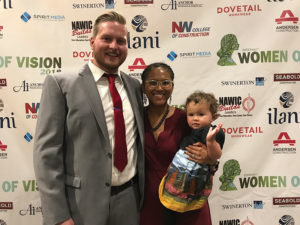 Nick Bjork with his wife, Karina, and daughter, Vivian.
Nick Bjork with his wife, Karina, and daughter, Vivian.
Nick Bjork, 32
Publisher, Daily Journal of Commerce, Portland, Ore. and The Daily Reporter, Milwaukee, Wisc.; group publisher, BridgeTower Media, Minneapolis, Minn.
Education: Lewis & Clark College, bachelor of arts, rhetoric and media studies
As the group publisher for BridgeTower Media, the business-to-business publication arm of GateHouse Media, Bjork oversees the company’s two construction trade publications, the tri-weekly Daily Journal of Commerce in Portland, Ore., and the five-days-a-week Daily Reporter in Milwaukee, Wisc.
Bjork started out as a reporter at the Daily Journal of Commerce covering land use policy and planning in 2009, and moved into advertising a few years later. In 2015, he assumed the role of publisher and was named group publisher in 2017.
In Portland, Bjork saw more than 20 percent growth in events each of the previous two years and more than 30-percent growth in special publications in 2018. He also launched a Women in Construction awards and education program that has grown from 100 to 700 attendees in six years, as well as launched a Skilled magazine, a print publication and website that provides information to high schoolers.
What advice do you have for other young professionals in the newspaper industry?
Embrace new technologies, new mediums and new ways of telling stories. That goes for both the editorial and advertising departments. The thirst for information and content is at an all time high, and we’re just now having a national conversation about the importance of ethos and credibility in information. It’s no coincidence that some of our most sacred newspapers are starting to see growth again. Legacy newspapers are well positioned to offer the most credible and useful information, as well as the most engaging advertising products. Even if your company hasn’t fully embraced them, I think it’s important as individuals that we embrace and become experts in all of the new platforms that people consume information through, just as we would embrace and become experts in the beat that we’re covering.
The other piece of advice I’d give is to really try to understand your publication and its audience. I see too many people get siloed in what they are doing and lose touch with their goal, providing useful and engaging information to their readers. I think it’s important to understand all facets of the business, and more importantly, who is consuming your content and why they are consuming it. When you truly understand that, it becomes much easier to develop an editorial strategy, or advertising products, that work.
What’s in your journalism toolbox?
Somewhat unfortunately, a phone with access to social media. While I don’t claim to be an expert in the use of social media, I believe it’s one of the easiest ways to gauge the cultural conversation and find out what people are interested in learning about.
I’m probably preaching to the choir here, but I also subscribe to a lot of newspapers and publications. I run publications that are ultra focused, both geographically and in terms of what we cover. I still make sure to keep tabs on both national publications and our local competing publications.
Lastly, I’d say a good sense of humor and an unhealthy sense of idealism. I tried leaving the newspaper industry once to sell real estate and ended up back at the same publication two years later. I missed being around a bunch of newspaper people when something big happened. There’s just no one else I’d rather be around to crack jokes with than the people in a newsroom.
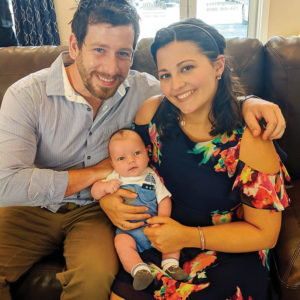 Jasmine M. Blussick Hughes with her husband, Jimmy and son, Jackson.
Jasmine M. Blussick Hughes with her husband, Jimmy and son, Jackson.
Jasmine M. Blussick Hughes, 30
Retail advertising sales manager, Pittsburgh Post-Gazette
Pittsburgh, Pa.
Education: Community College of Allegheny County, associate degree, marketing
Jasmine M. Blussick Hughes started her newspaper career one day before her 18th birthday at the Observer Publishing Company (OPC) as a full time inside sales consultant while also attending college in the evenings. She would go on to work for OPC for almost 11 years holding multiple advertising and marketing positions throughout the company, most notably as a manager at The Almanac newspaper.
In January 2017, she accepted a local retail advertising manager position at the Pittsburgh Post-Gazette. According to director of advertising and digital initiatives Adam Bush, in her first year, Blussick Hughes increased team revenue more than $350,000. In 2018, her team again surpassed the prior year by $150,000 and were the top performing group.
What advice do you have for other young professionals in the newspaper industry?
Be so passionate that your drive and energy come through in everything you do and affect everyone positively that you work with internally and externally. As young professionals, we are lucky in that we do not know the times when the industry was at its peak and the newspaper industry did not have the competition it experiences now both editorially and in advertising dollars. This advantage allows us, the young professionals, to help bring excitement back to our colleagues trying to adapt or those that may feel discouraged because they know what once was for the industry. Where they bring wisdom and history, we bring innovation and technology. The ideas and innovation we bring to the table not only help our newspaper but our industry. If you have an idea, conceptualize it and make it happen.
Get involved in the community and understand it. This will get you and your company ahead of the competition.
Knowing what you know now, what kind of advice would you give to yourself when you first started your career?
Find energy for what you are doing everyday and focus that energy in the right people and projects to help move toward your goals faster.
Listen and learn, but don’t hold back on your ideas because you are the youngest one in the room.
Search out mentors, within and outside the industry, and read more books related to my job—this is something I didn’t start doing until the last few years and it has been the biggest growth for me.
 Taylor Buley, 34
Taylor Buley, 34
Chief technology officer, McNaughton Newspapers; publisher, Winters Express
Fairfield, Calif.
Education: Stanford University, master of arts, communications; University of Pennsylvania, bachelor of arts, philosophy, politics and economics
Taylor Buley’s career began in high school when he started his own newspaper. He also published another while in college while serving at the Stanford Daily. Since then, he has worked for the likes of the Wall Street Journal, Forbes, and Parade magazine.
Once Buley arrived at the Winters Express, he began to transform the newspaper. Buley rebuilt the website for a more efficient display, tied it together with social media and launched live video via Facebook. He also went above and beyond his duties by creating a tool for the community in which they can share content with others directly through the website. This tool has now been added to two McNaughton publications and has produced more than 1,500 posts. Buley also reprogrammed the website to create an easy system for advertisers to use.
What advice do you have for other young professionals in the newspaper industry?
You need to be a steward of your own skills, and make sure you’re working to learn something indirectly useful to your job. I like to say journalists are “great at nothing, good at everything” and that takes some personal discipline to make true. On the job, on a deadline, there’s little time for professional development.
Keep your eyes and ears open for those who are willing to help you further hone your personal talents, either through partnership or mentoring. There are people who relish working with the best creatives they can find. Strive to be one, and strive to be among them. Your individual creative skills will enable you to join or build teams that will do even greater things together. It’s with a team that you will do your best work, but you need to be ready for the opportunity when it arrives.
Do you prefer working for a large publication like the Wall Street Journal or a small paper like the Winter Express?
I’m one of those journalists who is always looking to move things forward through storytelling. When you’re working for national news, that kind of meaningful change can be so incremental at times that it’s hardly noticeable. The competition can be a bit demoralizing and you hold as tight as possible to whatever scoops you can muster. When you work at the local level, the things you do are almost always noticed—for better or worse.
Almost everything is a scoop, because if you don’t cover it, nobody will. Doing this kind of coverage—the stuff that people cut out of the paper—makes it really easy to find pride in your work, even if it’s never going to make you a millionaire. Being held accountable by your neighbors can present its own challenges, but you can really have, and see, an impact on their everyday life.
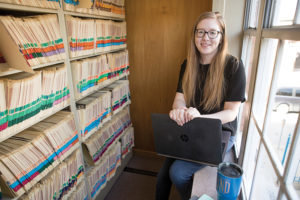
Lexi Cortes, 27
Investigative reporter, Belleville News-Democrat
Belleville, Ill.
Education: Southern Illinois University—Edwardsville, bachelor of science, mass communications
Lexi Cortes joined the Belleville News-Democrat just as they were preparing for a major change to their production system, which also required some reordering of the newsroom. According to growth producer Jason Koch, she was asked to fill two roles: one for the copy/design desk, the second as a reporter.
“She managed to fill both roles with aplomb, producing well-reported, well-written, and engaging stories while also helping us to edit stories for print and digital, lay out pages for print, and manage our website and social media accounts,” said Koch. “Eventually, the decision was made to make Lexi a full-time reporter.”
Cortes started working on the education beat and soon became the paper’s newest investigative reporter.
“We would love to have a staff full of Lexis,” Koch said. “She is certainly going to play a role in helping to keep the News-Democrat strong and, because of it, ensure that journalism remains strong in Southern Illinois.”
What advice do you have for other young professionals in the newspaper industry?
This is for the perfectionists like me: What we do is an art. And we’re doing it on a tight schedule. Try not to get down on yourself if you aren’t creating something you feel is good enough on the first go—or the second or the third. You got this.
And if you’re still stuck, the best thing to do is to talk it out with a friend, boss or Mom. You’ll see what interests them and what questions they have, which are likely to be the same for your readers or viewers.
How do you juggle all your responsibilities at the paper?
In my experience, it takes a to-do list, a healthy curiosity and a supportive newsroom.
I’ve taken the company up on every opportunity to learn something new because I’m genuinely interested in all of the different jobs in the room and because I care immensely about the work we do.
 Zach Dennis, 26
Zach Dennis, 26
Multimedia content editor, Savannah Morning News
Savannah, Ga.
Education: University of Tennessee—Knoxville, bachelor of arts, journalism and electronic media
Zach Dennis is an ideal newsroom leader in the digital age. He has applied his knowledge and enthusiasm to the Savannah Morning News methods and improved page views and innovative storytelling. According to Heather Henley, daily content editor, Dennis goes out of his way to work with each department and encourages them to expand and try new things. He helps journalists working on Facebook live videos and podcasts become more comfortable and confident in front of the camera and in the recording studio.
In addition, Dennis keeps the Morning News social media up to date, records and edits podcasts and videos, and leads all of his newsroom’s digital projects.
What advice do you have for other young professionals in the newspaper industry?
Be open to failing and learning on your own, and get as much hands-on experience as you can. One of my takeaways from the job so far is most of the components that have become paramount to my position, I learned from trying it out and seeing what would happen.
I’ve developed my podcasting skills from a desire to talk about movies and do audio work while in college, and five years later, the work blossomed into my podcast, Cinematary. Since then, those skills have helped shepherd some of the initiatives here at the paper and it all came from giving new areas a shot at least once.
Is it easier to train the senior reporters or the younger ones when it comes to digital?
Ironically enough, when it comes to multimedia elements for a story, our reporter who is past 40 years on the job brings me more planned and thought-out content than other reporters around my age. I say that not to slam the younger reporters, but to show that the skills come more from a willingness to learn rather than age.
That being said, I think it is still an uncanny valley to some extent and one of my goals is helping everyone think in that digital direction first. The industry has been print-focused for so long that it takes rewiring for a lot of the longtime reporters. But this newsroom has been ahead of my previous ones in terms of being open to hearing ideas and incorporating them, which I’m endlessly appreciative of.
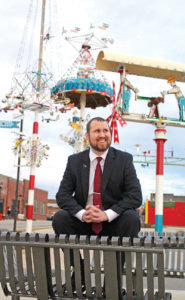 Corey Friedman, 34
Corey Friedman, 34
Editor, The Wilson Times Co.
Wilson, N.C.
Education: New Bern High School
As editor of The Wilson Times Co., Corey Friedman oversees news content for all five publications, and writes editorials on statewide and regional public policy issues for the group and exclusive local editorials for the company’s flagship daily, The Wilson Times.
Friedman has served as an integral part of the transition team for the company’s weekly newspaper acquisitions and coordinates the publications’ newsgathering, reporting and commentary.
Friedman also assists the Times’ media services division with proofreading and delegating the proofreading of partner publications’ newspaper pages. The Times’ design desk paginates the five Wilson Times Co. newspapers and also provides contract design service for one daily, one twice-weekly and two weekly papers.
What advice do you have for other young professionals in the newspaper industry?
Find mentors who can model effective leadership; be humble, be coachable and commit to being a lifelong learner. Editorial judgment is an acquired trait. I was the pain-in-the-neck cops reporter who would constantly ask my editors why a word, a sentence or a phrase in my story was changed. That’s how I learned not to repeat my mistakes. Fortunately, I had some great teachers who were willing to give honest feedback and match the time and energy I invested in my work. As an editor or manager, lead by example. Don’t ask your staff to complete a task you wouldn’t be willing to do yourself. Give your reporters the time and resources they need to work their beats, empower them to become subject-matter experts and champion their work within the company and in the community.
What are the benefits of working at a family-owned daily newspaper?
Being locally owned gives us the flexibility to make the right decisions for our paper without having to run everything up the corporate ladder for approval. We can leverage some of the efficiencies of newspaper chains on a smaller scale and become a laboratory for innovation. Instead of outsourcing our page design to a national hub, we expanded our copy desk and formed our own hub to take on contract pagination work for other independently owned papers. In the past year, our company has purchased four eastern North Carolina weeklies from retiring publisher-owners to preserve the papers’ legacies and prevent the communities they serve from becoming news deserts. We’re also proud to have a stake in our area’s growth and prosperity. As the city of Wilson built the Vollis Simpson Whirligig Park to pay homage to a native folk artist and fuel downtown revitalization, we moved our office to become part of Wilson’s #DowntownTurnaround. We live, work and play here, and we have skin in the game.
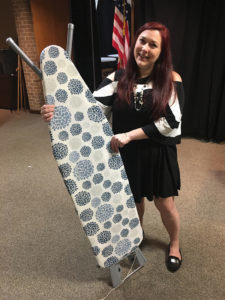 Stephanie Highfill with her ironing board after a Hot Springs Village Area Chamber of Commerce event.
Stephanie Highfill with her ironing board after a Hot Springs Village Area Chamber of Commerce event.
Stephanie Highfill, 29
Multimedia sales executive, Hot Springs Village Voice
Hot Springs Village, Ark.
Education: Cabot High School
Hot Springs Village Voice general manager Jennifer Allen describes Stephanie Highfill as “a go-getter with innovative ideas.” Thanks to her top notch digital sales skills, the paper has seen a 70 percent increase in digital growth in 2018 over 2017. She also won Best of Show in the 2018 Arkansas Press Association Better Newspaper Advertising Contest beating out newspapers of all sizes, dailies and weeklies.
“Stephanie has keen awareness of realities of context, mindfulness of connecting on a personal level with those she works with, and a standard of excellence at every turn,” Allen said. “She does not hold back raising up creative ideas for problem-solving and moving projects forward.”
What advice do you have for other young professionals in the newspaper industry?
Know your goals (and your pipeline) like the back of your hand. Rules were made to be broken, and “the way things have always been done” doesn’t mean it’s the way things should be done today. Believe in your product, and collaborate with your team to create innovative products you can believe in. Get involved and find ways to give back to the community. Stay humble and honest. It is okay to admit lack of understanding when it comes to digital, but do ask for help.
How do you get a potential client to say yes?
It’s not something that happens overnight. I take an interest in each individual client’s business, learning as much as I can so I can make well-informed suggestions. This may include creative, ad copy, placement, etc. I pay attention to the details, and provide total transparency in the deal-making process. I build the relationship on professionalism, trust and integrity, and maintain it after the “yes.” The effort is worth it; the real test of success is after the “yes” and maintaining client renewals.
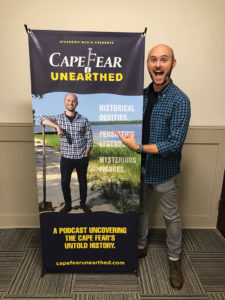 Hunter Ingram stands next to a promotional poster of his podcast, Cape Fear Unearthed.
Hunter Ingram stands next to a promotional poster of his podcast, Cape Fear Unearthed.
Hunter Ingram, 28
Food, drink and leisure editor and TV columnist, StarNews and StarNewsOnline.com
Wilmington, N.C.
Education: East Carolina University, bachelor of science, communication
Hunter Ingram’s ability to identify and consider audiences’ needs as well as deliver methods has led him to achieve great things in such a short time. Following his college graduation, Ingram thrived as a reporter covering the local film industry and Wilmington, a core city for the StarNews market, as well as taking time to focus on audience trends.
In 2017, Ingram took part in a national Knight Foundation-Lenfest Institute challenge that sought to identify local audiences and create digital content as well as experiences and events to cultivate more community involvement. As a result, he helped brainstorm, test and launch StarNews’ Port City Life, an experience and brand which aims to engage the 45-65 age group. The project includes monthly events, specialized content and a monthly magazine.
Ingram has also taken on other major initiatives, such as full responsibility for Cape Fear Unearthed, a podcast that shares stories of local history. He also writes a weekly TV column called TV Hunter that is shared throughout GateHouse Media. It was recognized as one of the “Best of GateHouse” last year and got him accepted into the Television Critics Association.
“More so than ever before, newspapers have to attract audiences that no longer wait for the news to get dropped on their doorstep,” editor Sherry Jones said. “The challenge requires intention, creativity and risk-taking to try new ways to create loyalty. Hunter is at the forefront of that in our newsroom.”
What advice do you have for other young professionals in the newspaper industry?
Take risks and don’t be afraid of your voice. This industry is evolving and having a fresh perspective on how to share the news with your communities is such an important asset in shaping the future. If you have out-of-the-box ideas on how to relate a story, don’t run from it. Embrace what you feel, it might shake things up and don’t be afraid to try it out. At the very least you learn a lesson that informs what comes next.
At a time when the media are quite often under attack, it can be very empowering to see your own voice in your writing. You learn a lot in journalism school about how to craft the perfect story, but getting out there and writing is the best way to find out who you are as a writer and a storyteller.
What are some important lessons you have learned from your audience?
I have learned that audiences are more open to trying new things than you might think. In launching my Cape Fear Unearthed podcast, I was skeptical that local history fans—generally a more mature audience—would embrace a podcast that required a reliance on technology and a willingness to be told a story apart from the newspaper and traditional storytelling. But I learned that if you take the time to recognize what they want and give it to them, they will follow—and might even surprise you. The podcast has reached not just long-time history fans, but families, younger generations and even the technology adverse.
I have also learned that your audience is your ally. It might not seem like it at times, when they don’t agree with your work or you struggle to find common ground with their views. But ultimately, they know what they want and a willingness to listen goes a long way to strengthening relationships in the community and building up thick skin.
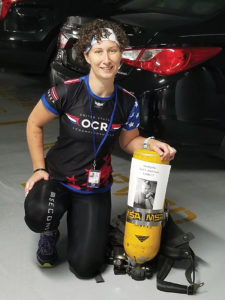 Mary Koester at the 2018 Clayton 9/11 Memorial Stair Climb.
Mary Koester at the 2018 Clayton 9/11 Memorial Stair Climb.
Mary J. Koester, 35
Managing editor and editor, North County News
Red Bud, Ill.
Education: Southern Illinois University—Carbondale, bachelor of science, photojournalism with a minor in psychology; Southwestern Illinois College—Belleville, associate degree, art with an emphasis on Spanish language studies
Mary J. Koester has worked in the newspaper industry for almost 12 years and has seen many changes in that time, from layoffs to newspaper closures, but she has worked hard to keep her paper relevant and important to her community.
To increase reader interactions, Koester added various contests, more features, special sections, new columns, an online/social media presence and experimented with augmented reality.
She also tries to be active in the community on behalf of the paper, such as participating in the new business program for high school students, and inviting other local papers to come speak on the importance of media relations, advertising and working with newspapers to these students.
In addition, Koester serves on the Red Bud Chamber of Commerce’s board of directors, the Randolph Community Foundation and the Southern Illinois Editorial Association.
What advice do you have for other young professionals in the newspaper industry?
Get to know your community and become a valuable part of it. Don’t be afraid to volunteer with various organizations or at the schools.
Also get to know the other papers/media in your coverage area. You may see them as competition, but they are another valuable resource. Look to others in your newsroom, as well as at neighboring papers, for help and guidance
Take all the trainings you can find to learn about what is new in the industry. The way people consume news is constantly changing, and so is the way we gather and share information.
Join news and media organizations, at the local, state and possibly national levels. Become active in those organizations if you can. This helps you get to know other media people in the area and trainings/seminars offered. This is such a valuable resource as you’ll meet others that deal with the same things you are.
Why is it important for you to be active in the community?
My newspaper has always been a part of the community—covering and supporting community events, the schools, churches and other organizations. We have also had employees be members in community organizations. I grew up in this community and am raising my family here, so it is especially important to me to continue that support.
Newspapers are the lifeblood of a community, especially a small, rural one. We are our community’s cheerleaders and ambassadors. We preserve the community’s history for future generations. It is imperative to help our communities continue to prosper.
Always keep in mind the newspaper is not just something that documents a community from an outsider’s perspective; we are a part of the community too.
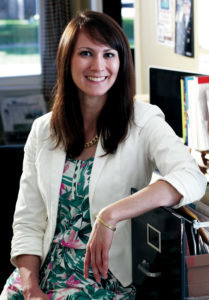 Courtney A. Lamdin, 31
Courtney A. Lamdin, 31
News editor, Times Argus
Barre, Vt.
Education: St. Michael’s College, bachelor of arts, journalism and mass communication with minors in gender studies and marketing
Courtney Lamdin recently joined the Times Argus in March. Before that, she served as executive editor of three weekly Vermont papers: the Colchester Sun, the Milton Independent and the Essex Reporter. She started at the Milton Independent as a reporter and photographer in 2009 and was promoted to editor a year later. She became executive editor in 2016.
Under her leadership, her papers won numerous print and web awards from the Vermont Press and New England Newspaper and Press Associations. She won a fellowship from the New England First Amendment Coalition in 2015, and has served as an adjunct professor and co-adviser at St. Michael’s College Journalism Department. In 2013, she was elected to the Vermont Press Association Board.
“Courtney is one that should be honored as an up-and-comer that has adjusted and helped her staff change to meet the multiple needs of today’s ever-changing media world. She always seems to find a solution,” said Vermont Press Association executive director Mike Donoghue.
What advice do you have for other young professionals in the newspaper industry?
Stay true to your roots. In this changing industry, we can all get bogged down with analytics and profit/loss statements—all important things—but make sure to create time for your team to do some real enterprise and investigative reporting. And do some yourself. You know your community best: What stories would really make a difference? I’ve found readers respond positively to this any time we can make it work. It only elevates your paper’s brand and status, which trickles down to better results in advertising and circulation. In a time when numbers are our focus, don’t forget what got you into this industry in the first place.
Also, do what you can to immerse yourself in your community. Show up to meetings, even if you don’t necessarily get a story out of it. Go to as many community events as you can. Be ever-present.
What are some typical questions you get from young reporters, and how do you answer them?
Young reporters often ask me how to deal with public officials who won’t call you back or give them records to which they’re entitled. I’ve hired a lot of fresh-out-of-college grads, and I always tell them to be unafraid of being “annoying.” Sometimes it takes multiple calls and emails to get a response, and if the person still doesn’t get back to you, show up at their office. Do all this politely, of course, but it’s important to establish a precedent that you’re not going to go away or stop asking questions. Ultimately, reporting is all about relationships, so it’s important to be present and show officials you’re doing diligence to get a full, accurate story. Usually, they’ll appreciate that.
 Kate Lisa swimming with elephants in Thailand last summer.
Kate Lisa swimming with elephants in Thailand last summer.
Kate Lisa, 25
Managing editor, Columbia-Greene Media
Hudson, N.Y.
Education: Auburn University, bachelor of arts, journalism
Kate Lisa was hired as a reporter for Columbia-Greene Media in 2014, immediately out of college. She reported for The Daily Mail, which serves Greene County in New York, and excelled at it, resulting in various other newspapers with larger circulations taking notice and recruiting her.
Within a few months, Columbia-Greene Media realized her value and brought Lisa back on to serve as the editorial series coordinator. A year later, she was named managing editor.
“As a manager, Kate continues to expand on her news and managerial knowledge and skills on a daily basis and her future is wide open to her becoming a true news leader,” said Mary Dempsey, Columbia-Greene Media executive editor.
What advice do you have for other young professionals in the newspaper industry?
Don’t be timid. If sources give you a road block, try every person or avenue to get around it to get the story. You never know who knows something, or knows someone else who does, so ask and be persistent. Be a pest. Show people you won’t go away until they respond. If people aren’t answering the phone or emails, get off your tuckus and go there. Put a face to the byline. Talk to random people on the street. This job is all about making relationships.
With your news writing, show, don’t tell. What do you see, hear and smell? Eavesdrop and ask the details.
Finally, if you don’t understand something a source says, don’t pretend like you do. If it’s a topic you’ve never covered before, don’t be ashamed to say, “Please explain this to me like I’m in the eighth grade” to get it right.
What was your favorite thing about being a reporter, and now as a managing editor?
My favorite thing about working as a reporter was the way the job opened my eyes to people I would have never spoken with. I’ll never forget talking to a 106-year-old woman about her memories of World War I and meeting Civil War veterans.
It was so important to interview Muslims at the height of the threat of ISIS, or people of color in our community after 14 police officers were killed in San Antonio in 2017. Reporting allows you to see life differently from a young age. I’ve covered fatal crashes, fires, tornadoes and homicides. Hearing the loved ones of those that die tragically, weep makes you hug people you care for that much tighter. It makes you appreciate life as a precious gift and to make the most of every moment.
As managing editor, I love seeing the paper from a reader’s perspective, and I most enjoy not having the pressure to write multiple stories for a daily deadline.
 Jaselle Luna, 33
Jaselle Luna, 33
Publisher and CEO, LOCAL Community News, LLC
San Antonio, Texas
Education: University of Texas—San Antonio, bachelor of business administration, real estate development and finance
One of Jaselle Luna’s biggest accomplishments was leading a redesign of LOCAL Community News in 2018. The company produces five full-color, direct mailed, monthly general-interest newspapers containing hyper local stories and other content.
The change in direction also attracted new advertising clients who wanted their brand associated with LOCAL, said Luna.
“When I introduced the idea of producing a redesign of LOCAL’s papers and brand, legacy professionals in the newspaper industry had their doubts and were not afraid to share them,” she said. “I went with my gut and did something new and different that was not the norm. Our brand has evolved over the past year, and we’ve been rewarded for our change in direction and forward thinking.”
What advice do you have for other young professionals in the newspaper industry?
Do more than what you get paid to do—people will notice. Over the last 10 years, I’ve had the opportunity to meet and work with numerous business professionals both in and out of the newspaper industry. Those who’ve progressed in their careers, been recruited by other companies, or started their own typically have one thing in common: they never take the path of least resistance. My advice is to work with excellence and do each task—no matter what it is—a little better. You will be rewarded. So, go the extra mile for an advertiser; secure an additional source for a story; find a solution before you are presented with a problem; and most of all, if you don’t know it, learn it. Ultimately, it is up to you to take initiative.
What are some lessons you learned from starting your own newspaper?
In the world of social media, everyone is a “reporter,” and everyone is an “expert advertising consultant.” One of the many lessons I’ve learned since starting LOCAL is that you can never be complacent. It is vital that we stay true to who we are as an industry and lead our teams with confidence.
In business, you never stay the same. You are either going forward or backward. The moment you get comfortable with how your organization is performing is the same moment you miss an opportunity and the next level of growth is disrupted. Just because something has always been done a certain way in our industry does not mean it cannot be improved. Personally, I strive to constantly evaluate and do my due diligence to better serve our communities, readers and advertisers. It is imperative to evaluate every department, every employee, every reason a sale or story is lost in order to make better decisions for the future.
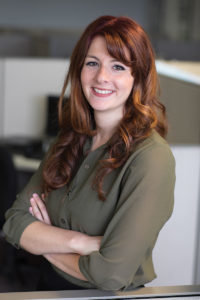 Jenna Macri, 25
Jenna Macri, 25
Events manager, Long Island Business News
Ronkonkoma. N.Y.
Education: Farmingdale State College, bachelor of science, professional communications with a minor in English literature
Jenna Macri came to the Long Island Business News as an intern while she was still a college student. Over the course of a summer, she wrote numerous pieces for the weekly publication, including a cover story. She eventually took on a full-time role as web editor and producer and stayed with the position for two years. Under her leadership, their web audience more than doubled in a single year.
Now as events manager, Macri commands a $1 million dollar event portfolio. She organizes four types of events, totaling more than 18 events per year with audiences that range from 100 to more than 600.
“Her role includes event planning from A-Z, vendor correspondence, copywriting and script writing, editing of special event publications, and direct communication with LIBN’s event honorees and attendees,” said publisher Joseph Giametta. “With all this on her plate, she still manages to bring fresh ideas to the table that have helped our events remain must-attend happenings in our community in a highly competitive event market.”
What advice do you have for other young professionals in the newspaper industry?
Don’t assume you know what you want to do—and don’t want to do—for a living.
When I graduated high school, I thought I wanted to be an English professor. When I transferred into a communications program, I thought I wanted to be a public relations specialist. When I interned in a newsroom, I thought I wanted to be an editor, and when I became a web editor, I thought I wanted to be a journalist.
How did I end up at a newspaper? Well, I took Journalism 101 to prove to my mother that I didn’t want to work for a newspaper.
So, how did I become an events manager? I was encouraged to apply while working as a web editor and producer. I was skeptical, but by that time, I’d finally learned an important lesson in business: you don’t know until you try.
If you had an unlimited budget, how would you plan an event for your publication?
I’ve wanted to plan a large-scale gala for a long time. It’d be a step away from the typical business atmosphere: something with great music, dazzling entertainment, and the presence of powerhouses in our business community. It’d be a momentous occasion that would even draw attendance from the Big Apple.
We would honor a local nonprofit and donate a portion of the proceeds. (My publisher and I launched a nonprofit beneficiary program in 2018 for all of our programs. It’s my favorite part of event planning.)
You would think that a business audience would be turned off by an event that doesn’t fit the status quo, but on Long Island, everyone likes a good party that supports a good cause.
 Rob Miller, 33
Rob Miller, 33
Digital editor, Bulletin
Norwich, Conn.
Education: Penn State University, bachelor of arts, advertising
Rob Miller’s expertise as an online editor has done wonders for the Bulletin’s website and their social media platforms. The Bulletin aims to provide context to its readers through digital layers, break news on social media and lead discussions with readers via these types of platforms. Live streaming is another way the newsroom aims to reach audiences and hopes to connect readers with must-read alerts through push notifications.
According to executive editor Jim Konrad, Miller’s ability to manage the digital realm of the Bulletin as well as his growing writing and reporting skills led him to become the newspaper’s morning reporter, delivering the news to readers electronically.
What advice do you have for other young professionals in the newspaper industry?
Watch a lot of TV, especially reruns of “The Office” because you can see the power of teamwork. A diverse cast of characters from all walks of life, backgrounds and experiences is needed to bring different talents to the table and make big things happen. One character doesn’t carry the show. Your office is no different. Know which character/s you are (I’m Ryan/Dwight). Know where you fit in your company’s big picture and do what you can to set your ensemble cast up to shine.
Stay up late. Just because your workday is over, doesn’t mean you can’t be doing things to give yourself or team an edge. Our sports department has this quote taped up: “Somewhere in the world someone is training when you are not. When you meet them, they will win.”
Be lazy when it comes to giving excuses on why you can’t do something. Be “sweatpants Sunday, entire sleeve of Oreos” lazy when it comes to that. Imagine if Steve Jobs said: “I have a phone, I have an iPod and I have an iMac. I’m good.” When you put off the excuses and put in the effort, there’s no telling what you can accomplish.
What’s the craziest breaking news story you had to put together, either as the online editor or as a photographer?
Ever see the movie “Nightcrawler?” Some people actually do that sometimes.
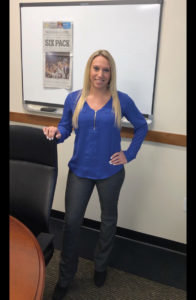 Brittany Prendiville, 27
Brittany Prendiville, 27
Digital marketing strategist, GateHouse Media
Worcester, Mass.
Education: Worcester State University, master of business management, marketing; bachelor of business administration, marketing, communications and economics
In a short period of time, Brittany Prendiville was promoted from her marketing position at the Telegram & Gazette in Worcester, Mass., to her current role as a digital strategist. She has been instrumental in leading weekly digital training and in client strategy, working alongside her peers to close business deals. Prendiville has also taken it upon herself to request an intern and manage his progress.
Leadership, according to Bernard Montgomery, “‘is the capacity and will to rally people to a common purpose together with the character that inspires confidence and trust.’ Brittany excels at this,” said Jana Johnsen, Telegram & Gazette multimedia sales executive.
What advice do you have for other young professionals in the newspaper industry?
Be confident in your ability to make a difference at a media company. There is no denying how much the media industry has changed over the years and it continues to change every day. With the insurgence of digital media, it takes creative and forward thinking to succeed in this industry.
Always know your worth and don’t hold back based on your age. You may come across peers that have not adopted the change in the industry but don’t let that deter you from your path. I started at what I originally thought was “just a newspaper” as a marketing coordinator and in under two years, I have received two promotions, eventually landing in my current role as a digital marketing strategist. I believe there is a bright future in this industry for young professionals with a passion for marketing.
Who are some important mentors who have helped you in your career?
Throughout my life, I have had the guidance of many mentors but there are a select few that have been instrumental. The first is Elizabeth Wark, business administration and economics coordinator, who I first came to know as my advisor during my freshman year at Worcester State University. I was a teenager with a definite passion for business but little to no grasp of where I wanted to go or how to turn that into a career. Over the course of four years, Dr. Wark helped mold me into the business woman I am today. More recently, I have worked closely with Dr. Wark to implement a marketing internship program between GateHouse Media and Worcester State University.
After graduation, I was hired by the Telegram & Gazette where I met my next crucial mentor Michele Marquis, vice president of multimedia sales. Michele gave me the freedom to show the company what I had to offer. Right out of the gate she allowed me to take on the task of creating, designing and implementing a brand new rewards program for Telegram & Gazette subscribers. This project was crucial in building my confidence and realizing my abilities in the business world.
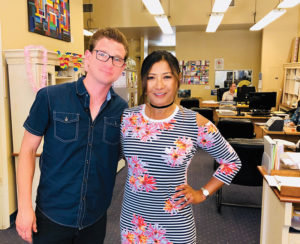 Steven Remery (left) and Linda Rosas Townson, senior vice president of Community Media Corp., in the Sun News office.
Steven Remery (left) and Linda Rosas Townson, senior vice president of Community Media Corp., in the Sun News office.
Steven Remery, 32
Group publisher, Orange County Neighborhood Newspapers
Seal Beach, Calif.
Education: University of La Verne, bachelor of arts, paralegal studies
Under Steven Remery’s leadership, Orange County Neighborhood Newspapers (OCNN) grew their ad sales and expanded their journalistic reach. He began as a salesman for OCNN and maintained sales growth of nearly 150 percent throughout three consecutive years. In 2016, Remery was named director of advertising. He also served as interim general manager before being named associate publisher in March 2017 and then group publisher in November 2017.
When allegations of sexual harassment surfaced regarding the Seal Beach chief of police, Remery withstood immense political pressure to allow the story to run, according to Event-News Enterprise editor David Young.
“(Steven) demonstrated the courage to hire editors like me who have worked in journalism perhaps longer than he has been alive,” Young said. “Nevertheless, when confronted with blistering pressure from officials, Steven has demonstrated an ability to listen to reason and act in the public interest, difficult as it may be.”
What advice do you have for other young professionals in the newspaper industry?
Persevere. Digital publishing has forever changed the news and publishing industry. Because of the internet, we now live in a world where almost anyone can manufacture their own news.
The high standards of journalism utilized by newspapers, however, give the public a greater sense of trust and respect for information we produce and that our readers are eager to consume. Therefore, newspapers still enjoy significant amounts of public trust and consist of worthy professions.
It is also important to note that while newspapers do face challenges there is still much opportunity, especially for hyper local community publications. Therefore, I would urge young professionals to find a job in a community in which they are comfortable and do their best work.
How do you motivate your staff during these challenging times?
We always work to make our entire staff feel at home during their working hours. As much as possible, I try to lead by example, and I make an effort to know each of our employees. In order to motivate them, it helps to know what drives them and what they need to excel and achieve.
The most effective form of motivation is recognition for doing an outstanding job, so we work very hard to create a comfortable environment, equip th
Comments
No comments on this item Please log in to comment by clicking here